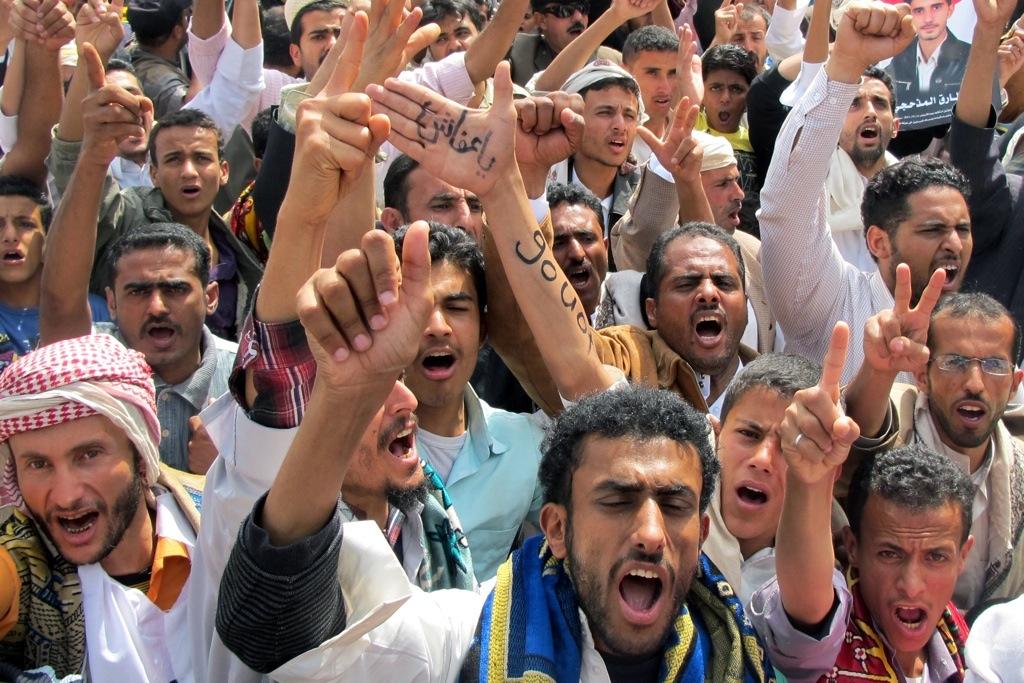Al Qaeda operative killed in drone strike (UPDATED)
A U.S. drone strike has killed fiery Islamist preacher Anwar al-Awlaki. Here Yemeni anti-government protesters chant slogans during a rally after the weekly Friday prayers in Sanaa on September 23, 2011.
BEIRUT, Lebanon — Hailed as a breakthrough by the government of embattled Yemeni President Ali Abdullah Saleh, the apparent killing in Yemen Friday of U.S. citizen Anwar al-Awlaki, one of America’s most wanted Al Qaeda operatives, in a U.S. drone strike, was met with gloom by opposition figures who argued it would be used by Saleh to woo further U.S. support.
“The Yemeni government has been targeting Awlaki for the last nine months. We came close to killing him in the past but failed. Today, we can proudly say that the Anwar Awlaki file is closed,” a senior Yemeni defense ministry official told GlobalPost.
Though U.S. officials also confirmed Awlaki’s killing, at least one cousin of Awlaki, speaking to a GlobalPost reporter in Sanaa, denied the Al Qaeda operative had been killed. Yemeni officials have in the past made several erroneous claims to have killed senior members of Al Qaeda in the Arabian Peninsula, the local branch of the terrorist network, known as AQAP. The strike left five people killed, but their bodies were burned beyond recognition, according to an eyewitness.
It has been long believed that Awlaki has been hiding among his large and powerful Awalik tribe based in Yemen’s rugged south-east province of Shabwa. The drone strike that hit a convoy and apparently killed Awlaki took place further north, near the border between Jawf and Mareb, around 140 km east of the capital Sanaa, an eyewitness and an official statement said.
“The bodies were burnt and we cannot tell who they are. But a U.S. drone was involved in the attack,” said Mohammed Abu Mukrib, an eyewitness from Zaqhwan district of Mareb province, where he said the attack took place. “No government forces were seen anywhere near the U.S. drone attack.”
Born in New Mexico to Yemeni parents, Awlaki became the first American ever placed on the CIA “kill or capture” list in April 2010 after U.S. and Yemeni intelligence officials tied Awlaki to the recruiting and preparation of a young Nigerian who attempted to detonate explosives hidden in his underpants aboard a U.S. airliner bound for Detroit on Christmas Day in 2009. Had the bomb gone off, it would have been the worst terrorist attack on U.S. soil since 9/11.
The 40-year-old Awlaki was for years an influential mouthpiece for Al Qaeda's ideology of holy war, with his English-language sermons urging attacks on the United States widely circulated online among militants in the West. Awlaki provided the terrorist group with a Western voice and analysts argue that with Awlaki's death the al Qaeda has lost its reach in the West.
Awlaki was also tied to U.S. Maj. Nidal Hasan, the alleged killer of 13 people in the Nov. 5, 2009, rampage at Fort Hood, Texas. Awlaki had exchanged up to 20 emails with Hasan, which were intercepted by the FBI. Some of these emails were shown to GlobalPost in Sanaa by a close friend of Awlaki’s.
Hasan had questioned the cleric on the Islamic justification of killing soldiers in their barracks, but if Awlaki gave an answer it was redacted in the emails seen by GlobalPost. But on his website, Awlaki later praised Hasan as a “hero” for killing American soldiers who would be heading for Afghanistan or Iraq to fight Muslims.
In October 2010, U.S. officials again tied Awlaki to a terrorist plot, this time to explosives found in ink cartridges on cargo flights originating in Yemen and bound for the U.S.
Ali Jaradi, editor of Ahale newspaper and a senior leader of the opposition Islah party said he feared President Saleh, who only returned to Sanaa one week ago after recuperating from an assassination attempt, would use Awlaki’s killing to make the case for further support from the U.S., which has spent tens of millions of dollars on Saleh’s security forces in an effort to combat AQAP.
“President Saleh will use Awlaki’s death to buy more time in power,” he told GlobalPost. “The international community must not be tricked. Saleh will kill as many people as needed to hold on to power.”
Abdel Ghani Aryani, a leading Yemeni political analyst, said Awlaki’s transformation from internet preacher to radical supporter of terrorism had occurred during his detention in Sanaa’s political security prison, where he met many of the radical militants who, having escaped prison in 2006, likely with support from sympathetic members of Saleh’s own security forces, would go on to found AQAP three years later.
“Al Qaeda has been used as a scarecrow by the Saleh regime for many years. It tries to manipulate the West in claiming to fight Al Qaeda when in fact it has been providing safe haven and aiding and abetting known Al Qaeda figures,” said Aryani.
“U.S. authorities should be more sophisticated than to use this regime to fight terrorism, as the regime will continue to create terrorists in order to stay in power,”
Mohammed Khobari, an expert on Al Qaeda and director of the Sanaa-based Abaad Center said: “The death of Awlaki is a blow for AQAP. He was their window to the West and knew how to plan attacks against them as he lived most of his life in the West. Now, AQAP will be handicapped and will focus more on domestic attacks.”
We want to hear your feedback so we can keep improving our website, theworld.org. Please fill out this quick survey and let us know your thoughts (your answers will be anonymous). Thanks for your time!
